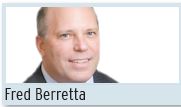 What we think is the right road
What we think is the right road
There are a number of Catholic leaders, both ordained and lay people, who “challenge the narrative.” That is, they are willing to blaze new trails and bring Catholic doctrine “up to date.”

 What we think is the right road
What we think is the right road
There are a number of Catholic leaders, both ordained and lay people, who “challenge the narrative.” That is, they are willing to blaze new trails and bring Catholic doctrine “up to date.”
